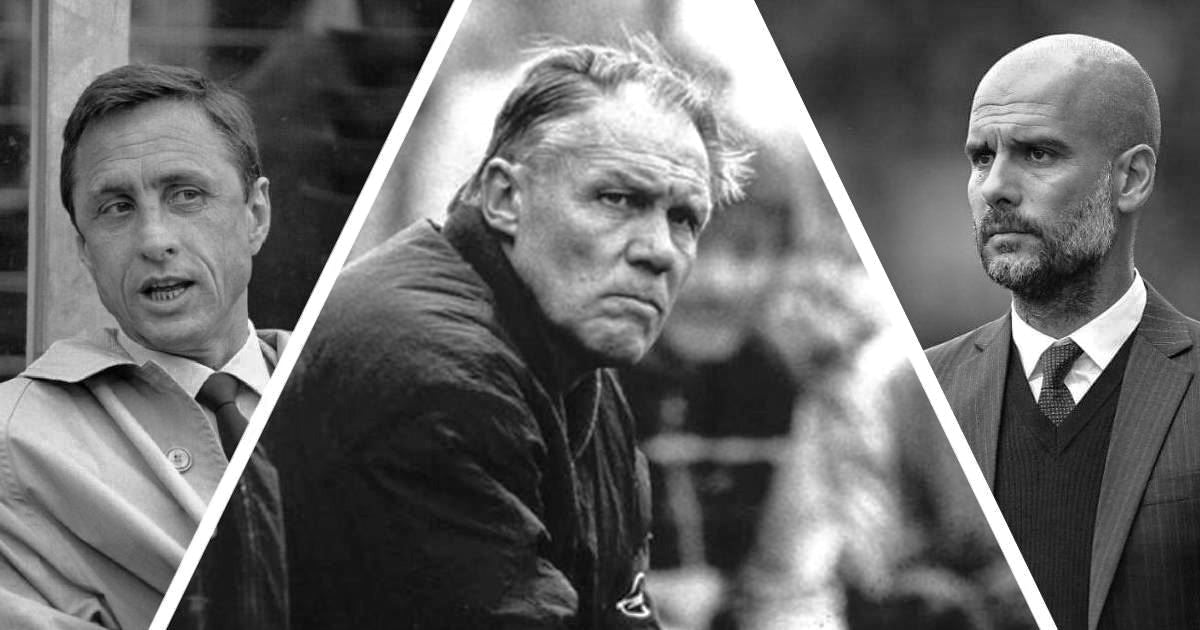
Total Football
TOTAL FOOTBALL
The popularity of the “Catenaccio” in the 1960’s by Helenio Herrera was game-changing in that it focused its tenets on defending and the art of counter attack. This would go on to define the Italian mastery of the art of defense. However, it was “Total Football” in the 1970’s that revolutionized that game and became a system of play that disrupted all strategies that came before its execution.

Total Football is a concept of play in which any outfield player can take on the responsibilities for any other outfield player on the field. In this system, a player who moves out of his position is replaced by another from his team, thus retaining the team's intended organizational structure and formational integrity. Its core foundations are based on adaptability of players to fill different roles depending on the situation, thereby scrambling play and keeping opponents on their toes.

Ajax and the Netherland
Although Dutch club Ajax and the Netherlands national football team are generally credited with creating this system during the 1970’s, there were others who played in a similar style, just perhaps without a defined term. For example, you can observe similar tactics deployed by the Austrian Wunderteam of the 1930’s, the Argentine "La Maquina" of River Plate in the 1940’s, the Golden Team of Hungary in the 1950’s, the English team Burnley in the late 1950’s and early 1960’s, and the Brazilian Santos in the 1960’s.

Johan Cruyff
Nonetheless, the most famed team of the modern era, the Dutch of the early 1970’s, was the team that made Total Football a recognizable phenomenon. With Johan Cruyff at the epicenter of the glittering Netherlands team, the world once again witnessed Total Football, but at a whole new level. For two World Cups in a row (1974 and 1978), the dominating Dutch essentially slaughtered every team that came across their path. The only misfortune lay in the fact that this legendary team failed to actually win the World Cup in this era, ultimately losing to Peru and England, respectively.

The system is based on two tenets: the full utilization of space and the fluidity of positions. It's tactical success depends largely on the adaptability of each player within the team, particularly the ability to quickly switch positions depending on the on-field situation. The theory requires everyone to be comfortable in multiple positions. Excellence in executing this strategy requires intuitive, creative, intelligent and technically diverse players.
With this level of fluidity, no outfield player is in a fixed, predetermined role. Reading the play, interacting with teammates, anyone can successively play as an attacker, a midfielder and a defender. The only player who must stay in a specified position is the goalkeeper.

The formation most associated with Total Football is the 4-3-3, which becomes a 3-4-3 when the libero moves into the midfield to match an opposition’s 4 man midfield. Unlike other teams that were engaged in horizontal switches, the Dutch national team and Ajax engaged in wholesale positional switches across each flank which allowed for players to push and drop off creating baffling patterns across the field.
It was a state of extreme flux as players from either flank moved interchangeably while still protecting the team’s structure. Essentially, a fullback could be playing as a winger, or a defender as a striker as they transitioned seamlessly. Players were pushed up and everyone could defend and attack, the fluidity of the style did not compromise the defensive effectiveness of the team.

Rinus Michels
Total Football was not just about attacking. Coach Rinus Michels demanded an intense pressing scheme that smothered opposing players and allowed them no time on the ball. Credited as saying, “Professional football is something like war. Whoever behaves too properly, is lost,” Michels had a significant impact on implementing Total Football and influencing the up-and-coming Cruyff.

The direct results of the Netherland’s legacy of ’74 Total Football are still seen today. Michel’s chief collaborator and protégé, Johan Cruyff, made the rare progression from genius player to genius coach. He brought his philosophy of Total Football and injected it into the DNA of FC Barcelona. The Catalonian team of 2009 is still regarded as one of the best teams to have ever graced the game. He also created the culture and foundation from which his protégé, Pep Guardiola, could create and lead one of the best club teams of all time.
Join us. Be a TENLEGEND.™
